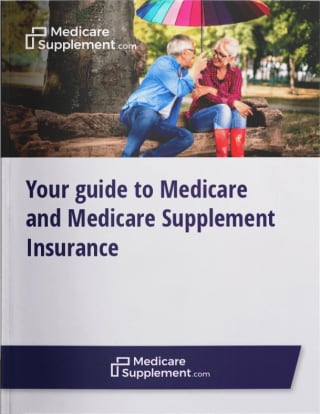Medicare Part A covers limited skilled nursing care, as long as it is medically necessary to treat an injury or illness and you meet certain conditions. Medicare does not cover long-term care or custodial care, if that is the only care you require.
If you receive care in a skilled nursing facility, you will typically face certain out-of-pocket Medicare costs.
A Medicare Supplement (Medigap) plan can help pay for your skilled nursing facility care costs, such as Medicare deductibles and coinsurance.
 Medigap plans can help cover care you receive in a skilled nursing facility.
Medigap plans can help cover care you receive in a skilled nursing facility.Who Qualifies for Skilled Nursing Facility Care Coverage?
Medicare may cover certain nursing home costs if:
-
Your doctor decides you need care from skilled nursing facility staff
-
You receive care at a skilled nursing facility that’s certified by Medicare
-
The skilled services you receive address a medical condition that was treated during your qualifying three-day inpatient stay in a hospital
How Much Do Skilled Nursing Facilities Cost?
Medicare Part A will help pay for skilled nursing care for up to 100 days at a time. Called a "benefit period," these benefits reset when you've stopped receiving skilled nursing care for 60 consecutive days.
Your Part A benefits work like this:
-
Medicare Part A pays all of your costs for the first 20 days. You pay nothing.
-
For days 21-100, you are responsible for a daily $217 coinsurance in 2026.
-
If you require skilled nursing care longer than 100 consecutive days, you are responsible for all costs.
There are other additional conditions to keep in mind. Be sure to ask your doctor or health care provider about whether the services they provide will be covered by Medicare.
Custodial Care vs. Skilled Nursing Facility Care
Custodial care is non-medical assistance with daily activities such as bathing, dressing, eating and using the restroom. Custodial care can occur at a person's home or in a nursing or assisted living facility.
Although Medicare does not cover custodial care, it does cover some skilled nursing services (for a limited time under certain circumstances), including:
-
Semi-private rooms
-
Food
-
Skilled nursing care
-
Physical therapy and occupational therapy
-
Speech-language pathology care
-
Prescription drugs
-
Social services
-
Medical equipment and supplies
-
Counseling on your diet
-
Transportation via ambulance
Medicare Part A also covers intermittent skilled nursing care at home, but it is restrictive.
Certain Medigap Plans Help Pay for Skilled Nursing Care
If you're concerned about your ability to pay for a lengthy round of skilled nursing care, certain Medigap plans can help.
Eight of the 10 standardized Medigap plans available in most states offer at least partial coverage for your skilled nursing facility coinsurance. Six Medigap plans cover these costs completely.
Keep in mind that Medigap plans won't pay for long-term nursing home care or custodial care, either.
Other Original Medicare out-of-pocket costs include:
-
Part A deductible ($1,736 per benefit period in 2026)
-
Part B deductible ($283 per year in 2026)
-
Part A coinsurance ($434 per day for days 61-90 spent in a hospital per benefit period in 2026). Your coinsurance will increase if you go beyond day 90.
-
Part B coinsurance (20% of the Medicare-approved amount for most doctor services)
Does Medicaid Cover Nursing Homes?
Medicaid is a means-tested program, which people must meet strict financial eligibility requirements to qualify. If your income drops below the qualifying mark and you are accepted into the program, Medicaid will cover 100% of your nursing home expenses at a Medicaid-approved facility.
Although there are some exceptions to the rule to protect the livelihood of a spouse, Medicaid generally begins paying for nursing home care once your assets fall below $2,000. Individual eligibility requirements vary based on your age, marital status and home state, so check with your local Medicaid office to learn more and apply for benefits.
Long-term Care Insurance
Before you are sick enough to require nursing home care, you can purchase long-term care insurance to help offset some of the costs down the road. These policies, which are sold by private insurance companies, can help cover different types of skilled and non-skilled nursing care.
Long-term care insurance will usually reimburse you for a certain amount of money per day to help cover the expenses of your care.
This type of insurance can be expensive (often a few thousand dollars a year, at least), and there is no guarantee your application will be accepted if you are applying for a policy in poor health. Due to medical underwriting, the best time to buy a policy is when you are young and in good health to avoid paying considerably higher premiums.
Federal employees, members of the uniformed services, veterans, retirees and their spouses may be eligible to buy long-term care insurance at a discounted rate through the Federal Long Term Care Insurance Program (FLTCIP). Contact the program to see if you qualify for group benefits.
Veterans Assistance Programs
If you are a veteran, you have some additional options when it comes to paying for long-term care. Veterans and survivors who receive a VA pension may be eligible for an increased monthly payment if they require the aid and attendance of a caregiver to help perform daily tasks.
This increased monthly allowance can be used to pay for an at-home caregiver or be used towards care in a facility. Eligibility for the Aid and Attendance benefit is dependent on overall financial need.
State VA nursing homes are also an option for veterans and spouses. Generally, a veteran or a spouse must be at least 70% disabled to qualify for care in a VA nursing home, and he or she cannot be receiving the Aid and Attendance benefit at the same time.
Eligibility for VA nursing homes vary from home to home, and it is likely that you will encounter a waiting list when applying for care in one of these facilities. Learn more about VA benefits and medicare!
Tax Deductions for Nursing Home Care
The cost of room, board and all medical procedures received at a nursing home are tax deductible using the Medical and Dental Expense Tax Credit. Tax deductions work by lowering your taxable income, allowing you to give less money to the government in the form income taxes.
Deducting your expenses will not provide you will direct funds to pay for long-term care, but it can help reduce your overall financial burden and help you reallocate resources elsewhere.
Additional Resources for Nursing Home Costs Help
Learn more about common procedures that medicare covers.
A licensed agent can help you decide on a Medigap plan option that works for you. Call today to speak with a licensed agent and compare the Medigap plans that are available where you live.




